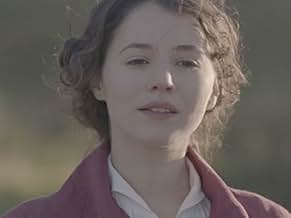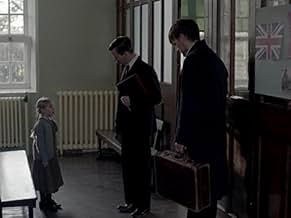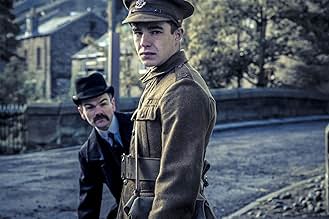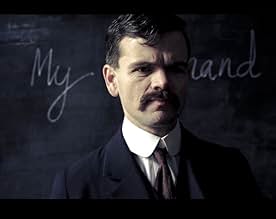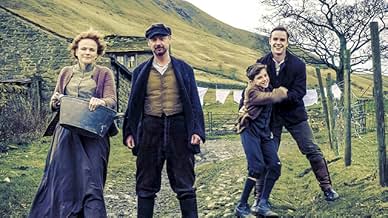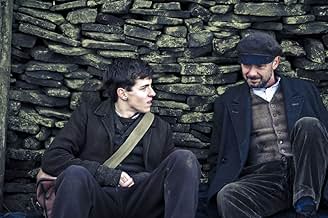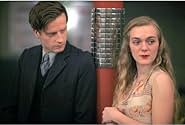Suit les habitants d'un village anglais au 20ᵉ siècle et leur vie mouvementée.Suit les habitants d'un village anglais au 20ᵉ siècle et leur vie mouvementée.Suit les habitants d'un village anglais au 20ᵉ siècle et leur vie mouvementée.
- Nomination aux 3 BAFTA Awards
- 6 nominations au total
Parcourir les épisodes
Avis à la une
IN A NUTSHELL: Wonderful cast of talented actors, terrific cinematography. Terrible scriptwriting to the point where at times it's nearly unwatchable.
It would take far too long and too many words to detail what's wrong with this production, and you don't want the spoilers anyway. So I'll give you the mile-high viewpoint, and if you watch, see if you agree.
Above all, this is yet another depiction of the 19th and 20th Century chock-full of spurious 21st Century mores. As if people THEN thought the same way people do NOW. That ruins the historicity of it for me.
The writers are far too intent on preaching modernist socio-political thought to give you an accurate depiction of life in rural England in the 1910s, 20s and 30s.
In every instance of moral dilemma - which after all is what drama is inevitably about - what someone WANTS is always given precedence over what they OUGHT to do from a traditional ethical and moral perspective. In fact, "what one ought to do" is uniformly presented as stunted or even evil. No, you shouldn't honor your marriage vows if you FEEL like doing something else. No, you shouldn't hold fast to your religious convictions, because religion is for nutters. Feel like having sex on the spur of the moment? Go for it; it's what you WANT to do (outmoded ideas of moral fidelity are barbaric anyway).
I watched this because the actors in the drama manage to rise above bad writing and horribly inaccurate social history. The scenes of rural life are breathtaking.
But the story is not. It's maudlin, prissy and factually inaccurate.
It would take far too long and too many words to detail what's wrong with this production, and you don't want the spoilers anyway. So I'll give you the mile-high viewpoint, and if you watch, see if you agree.
Above all, this is yet another depiction of the 19th and 20th Century chock-full of spurious 21st Century mores. As if people THEN thought the same way people do NOW. That ruins the historicity of it for me.
The writers are far too intent on preaching modernist socio-political thought to give you an accurate depiction of life in rural England in the 1910s, 20s and 30s.
In every instance of moral dilemma - which after all is what drama is inevitably about - what someone WANTS is always given precedence over what they OUGHT to do from a traditional ethical and moral perspective. In fact, "what one ought to do" is uniformly presented as stunted or even evil. No, you shouldn't honor your marriage vows if you FEEL like doing something else. No, you shouldn't hold fast to your religious convictions, because religion is for nutters. Feel like having sex on the spur of the moment? Go for it; it's what you WANT to do (outmoded ideas of moral fidelity are barbaric anyway).
I watched this because the actors in the drama manage to rise above bad writing and horribly inaccurate social history. The scenes of rural life are breathtaking.
But the story is not. It's maudlin, prissy and factually inaccurate.
Criminally underrated writer/producer, Peter Moffat, showcases his prodigious versatility by following up his brilliant legal drama, Silk, with the equally compelling The Village.
The Village chronicles the lives of the inhabitants of a small country town as they struggle to adjust to the turbulent societal upheaval brought about by the First World War. From the gentry to the poverty stricken working class, the shocking realities behind closed doors belie the idyllic surrounds of the Derbyshire countryside.
The Village is far from feel good entertainment. It's dark themes and gritty period realism creates viewing that is often emotionally harrowing, but undeniably brilliant.
Despite the explosive era in which it is set, the narrative threads of the series are predominately insular and familial, relying on interpersonal relationships to create drama. The results are riveting, primarily thanks to the vast array of intriguing characters and superb performances by the stellar cast. Moffat is a genius at writing fascinatingly unconventional characters that are neither heroes nor villains, but ambiguously grey. Unlike many male writers, he also consistently imbues his shows with multifaceted females roles that are equally if not more dynamic than their male counterparts.
Moffat's leading lady from Silk, Maxine Peake, is the emotional center of the series. Peake remains one of the finest actresses working today and if there is any justice The Village should garner her some long overdue recognition.
http://infilmandtvland.wordpress.com/
The Village chronicles the lives of the inhabitants of a small country town as they struggle to adjust to the turbulent societal upheaval brought about by the First World War. From the gentry to the poverty stricken working class, the shocking realities behind closed doors belie the idyllic surrounds of the Derbyshire countryside.
The Village is far from feel good entertainment. It's dark themes and gritty period realism creates viewing that is often emotionally harrowing, but undeniably brilliant.
Despite the explosive era in which it is set, the narrative threads of the series are predominately insular and familial, relying on interpersonal relationships to create drama. The results are riveting, primarily thanks to the vast array of intriguing characters and superb performances by the stellar cast. Moffat is a genius at writing fascinatingly unconventional characters that are neither heroes nor villains, but ambiguously grey. Unlike many male writers, he also consistently imbues his shows with multifaceted females roles that are equally if not more dynamic than their male counterparts.
Moffat's leading lady from Silk, Maxine Peake, is the emotional center of the series. Peake remains one of the finest actresses working today and if there is any justice The Village should garner her some long overdue recognition.
http://infilmandtvland.wordpress.com/
The Village captures you with it's imagery, but holds you with the characters and superb acting. It's sometimes hard to watch as the grim reality of early 20th century rural English life is relentless.
The BBC should be praised for not giving it a coat of historical whitewash and trying to depict life in the period with with both the warts and the beauty. Ultimately it is the characters that you become invested in. Not the stock portrayals of the noble working class or morally vacuous upper class. The main characters have layers and depth that makes them both interesting and empathetic. They are brought to life by terrific performances and you believe them completely.
Overall this is superbly done.
The BBC should be praised for not giving it a coat of historical whitewash and trying to depict life in the period with with both the warts and the beauty. Ultimately it is the characters that you become invested in. Not the stock portrayals of the noble working class or morally vacuous upper class. The main characters have layers and depth that makes them both interesting and empathetic. They are brought to life by terrific performances and you believe them completely.
Overall this is superbly done.
We are all one family, as the Latin saying goes, and THE VILLAGE is an excellent proof to it.First,cheers to the script writer!Mr. Moffat has managed to tell us the simple things of everyday life of simple people without being banal;he presents heart-breaking stories without making them cheap melodrama;he is very meticulous in showing the historical background of the events without making them text-bookish boring.Second,excellent acting!True, nowadays, the British school of acting is the best in the world.Not a single false note or a gesture;perfect(as is a rule in all British films)enunciation and intonation in the speech of all, socially and educationally very different, protagonists.Third,a very good direction:all episodes are logically and emotionally connected,giving the viewers the complete understanding of the motivation of the heroes' actions. I just wish THE VILLAGE a long and successful screen life!
I have just sat through the entire series in one evening. It was far from 'boring', in fact i found it to be one of the best things I've seen on the BBC all year. I have seen some comments on other sites which quibble over small inaccurate historical details - such as the Midlands bus in episode 1 - but I find that sort of critque nit-picky, especially if you take into account the FEEL of the show, in the way it is both acted and shot. I found myself loving and hating all the characters, trying to figure out what they'd do next, how they would cope with this or that. As for the show being 'depressing', well, quite honestly - what did someone watching a show about WW1 expect? You get what you sign up for. Yes, it is depressing, but its the kind of sad that makes your heart swell and your mind race, waiting impatiently for the next episode to start loading to see where they'll take us on this highly emotional journey. It felt dirty, beautiful and very real indeed. High props. Lovers of period drama, a MUST SEE.
Le saviez-vous
- AnecdotesMusic provided by the University of Salford brass quintet (the same university that Maxine Peake attended).
Meilleurs choix
Connectez-vous pour évaluer et suivre la liste de favoris afin de recevoir des recommandations personnalisées
- How many seasons does The Village have?Alimenté par Alexa
Détails
Contribuer à cette page
Suggérer une modification ou ajouter du contenu manquant


